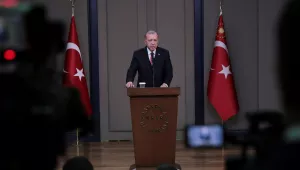Overview
Private military men patrol Iraq in constant jeopardy of stepping on legal landmines.
YOU WON'T FIND THE WORD "MERCENARY" on the homepage of the International Peace Operations Association, the trade group for the private military industry. While many of the IPOA's member companies are staffed by elite former soldiers of the United States military who now make a living hiring themselves out, the so-called "M word" isn't in the IPOA's corporate vocabulary. Members are known as private military companies (often called PMCs) or military service providers, who specialize in "private peace operations." Their model isn't "Mad" Mike Hoare, who gained notoriety for his exploits in the Congo during the 1960s and in a failed 1981 coup attempt in the Seychelles; it's the management consultants of McKinsey & Company.
In recent years, private contractors have increasingly taken on important military functions, operating in some 50 countries and earning an estimated $100 billion in annual revenue. They provide security to civilian aid workers, other contractors, and even military forces. They train local armies for combat, develop future American soldiers (the firm MPRI helps run ROTC), and interrogate prisoners. At times, they've engaged in combat. During the invasion and occupation of Iraq, the U.S. has relied heavily on their support—private contractors make up a workforce of about 20,000, double the British troop presence.
Even as PMCs have incorporated and in some cases offered shares of stock to the public, Mad Mike's legacy has been hard to shake. Allegations of U.S. security provider DynCorp's involvement in a sex-slavery ring in the Balkans and the involvement of translators from the U.S. firm Titan and private interrogators from CACI in the Abu Ghraib scandal illustrate the dangers of outsourced force run amok. As corporations acting in foreign jurisdictions, PMCs are notoriously difficult to police, and because their employees combine unparalleled combat expertise with deep expense accounts, PMCs are often portrayed as rogue outlaws who have achieved high rates of return. The industry is treated by critics as an unaccountable scourge and by proponents as the newest thing in modern warfare, offering twice the capability at half the cost.
But this portrait is inaccurate. PMCs are better understood as a case study in the unintended consequences of privatization. They are products of the elaborate rules—like tort laws, contract laws, and insurance and securities regulations—that shape all corporations. This regulatory structure imposes constraints on contractors and, by extension, on the militaries that hire them. As a result, the U.S. is getting more than it bargained for and less than it's paying for from this burgeoning alternative to the military.
MODERN PMCS EMERGED AS A RESULT OF THE COLD WAR'S END, which generated the supply and the demand for their services. After the fall of the Berlin Wall, both the U.S. and the USSR looked to reap peace dividends by scaling down their militaries. The private military service industry provided a lucrative, if less stable, extension to careers in the armed forces, particularly for the elite special operations forces that are PMCs' hiring pool of choice. The frequent religious, ethnic, and regional conflicts that flared up during the resulting thaw stimulated demand, whether in Bosnia, Colombia, or Sierra Leone.
In the U.S., in particular, the PMC industry was fueled by the same zeal for market-based approaches that drove the deregulation of the electricity, airline, and telephone-service industries. The military was considered to be particularly well-suited to public-private partnerships, because the need for its services fluctuates so radically and abruptly. Given such sharp spikes in demand, it was thought, it would be more efficient for the military to call on a group of temporary, highly trained experts in times of war—even if that meant paying them a premium—rather than to rely on a permanent standing army that drained resources—with pension plans, health insurance, and so forth—in times of peace.
At the same time, as the military sought to transform warfare through precision munitions, robotics, and joint-service operations, it relied increasingly on contractors for their technical expertise. During the Iraq war, contractors have run the computers that control Predator drones, operated guided missile systems on naval ships, and maintained aerial surveillance and communications systems. In the Persian Gulf war of 1991, the ratio of soldiers to contractors was 50 to 1. In the current Iraqi conflict, it is 10 to 1 and falling.
This proliferation has worried many—in the academy, Congress, the media, and, increasingly, the military—because contractors operate outside the military chain of command and most legal jurisdictions. PMCs have no clear place under the framework of the Geneva Conventions—they aren't noncombatants, because they carry weapons, but they aren't lawful combatants, because they don't wear uniforms. Nor do they fit the anachronistic definitions of mercenaries found in international treaties and resolutions, because those definitions generally require engagement in direct combat.
Soldiers are subject to rules of engagement and can be court-martialed for breaking the law. Contractors are governed most directly by the terms of their contracts—their extraterritorial activities and corporate status make them virtually immune from federal law. While some contractors are civilians accompanying an armed force in the field and are subject to military law, that law applies to other civilians only when there's been a formal declaration of war. There hasn't been one of those by the U.S. since World War II. Soldiers serve their country; contractors serve their managers and shareholders.
Worse, critics argue, because the military has no direct control over its contractors, it won't accept responsibility for their actions. And PMCs allow the Pentagon to evade accountability to Congress, because they circumvent caps on the number of troops approved for deployment and their casualties aren't counted.
EACH OF THESE CONCERNS IS GROUNDED IN TRUTH. But PMCs do not operate free of constraints. They are beholden to a series of corporate imperatives—the particulars of tort law, the actuarial calculations underlying insurance rates—that is changing how war is conducted. As much as their autonomy, it is this network of laws and regulations that PMCs bring from the boardroom to the battlefield that warrants attention.
For example, while soldiers cannot sue the military for injuries sustained in battle, contractors can sue their employers. Last January, the families of four contractors from Blackwater Security Consulting who were killed in Fallujah, Iraq, in 2004 filed a wrongful death suit in North Carolina state court. They alleged that Blackwater had put the men at risk by breaching corporate protocol—forcing an undermanned team to use an unarmored vehicle that lacked a heavy machine gun. Blackwater argued that a federal statute limited the company's tort liability, but this argument was recently rejected.
If the families prevail, the precedent will be far more significant than whatever damages Blackwater is ordered to pay. The suit is among the first to be filed on behalf of contractors in Iraq, but with over 200 contractors known to have died there so far, many more suits are likely to follow. And the cost of any damages awarded will be passed on to the military in higher fees and diminished willingness to take on high-risk engagements.
Another significant constraint on both PMCs and the clients they bill is insurance coverage. Early in the Iraq war, several companies of soldiers found themselves in particularly dangerous parts of Iraq without food or fresh water, because the contractors in charge of supplying provisions were unable to fulfill their contracts. The PMCs had been priced out of the market by the life insurance that is a prerequisite for fulfilling military contracts abroad. In the weeks leading up to the invasion, rates increased six-fold, and since then, some PMCs have had to pay up to 40 percent of their overhead in insurance premiums—costs that are financially crippling and unsustainable. But there is little incentive for insurers to drop their rates. PMCs engage in risky activities in dangerous places. And due to provisions in federal legislation, the U.S. government reimburses payments for combat-related claims, essentially re-insuring the insurers.
Importing a labor market into the combat zone has also generated some unintended consequences. While even elite soldiers are compensated like mid-level bureaucrats, contractors are compensated like management consultants. This makes a certain economic sense—the market is indicating the true value of labor that has been artificially undercompensated due to the nation's monopoly on military service. The effect, however, is that the military's labor force has been cannibalized, in particular the top echelon. Lured by four-fold salary increases, many soldiers have decided to go private rather than re-enlist. As a response, the Pentagon announced last winter that it would offer its Army, Navy, and Air Force special operations troops bonuses of up to $150,000 as an incentive to stay for up to six years—the largest bonuses enlisted troops have ever received. Where there's a labor market, there are inevitably labor disputes as well: In recent months, a contractor in charge of operating Iraqi ports and a contractor responsible for securing the Baghdad airport temporarily shut down their operations when they weren't paid on time.
Tort liability, insurance premiums, pay-scale discrepancies, and work shutdowns are an unattractive backdrop to the exposés of corporate mercenaries in the news. But understanding what makes PMCs run—or forces them to halt—is essential now. As the military continues to miss its recruiting targets and the Bush Administration continues to feel pressure to bring American troops home, contractors may find themselves shouldering the brunt of the reconstruction of Iraq.
If we can afford them. The financial cost of a long-term, privately operated reconstruction effort has yet to be calculated, but these concerns cast serious doubt on the key assumption shared by the Pentagon and its fiercest critics: that PMCs allow for an aggressive foreign policy on the cheap and quiet.
Rebecca Ulam Weiner, a fellow at the Kennedy School of Government at Harvard, is studying private military companies.
Weiner, Rebecca. “Sheep in Wolves' Clothing.” Legal Affairs, January / February 2006
The full text of this publication is available via Legal Affairs.





